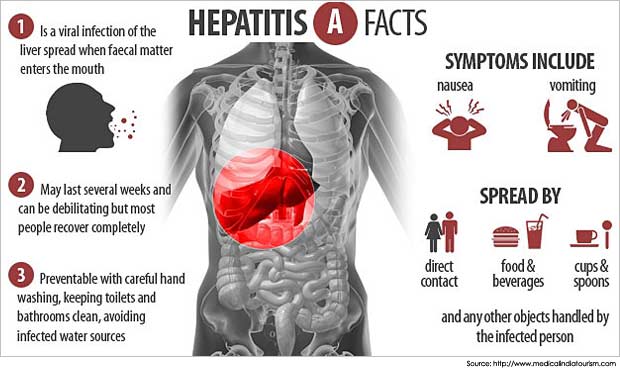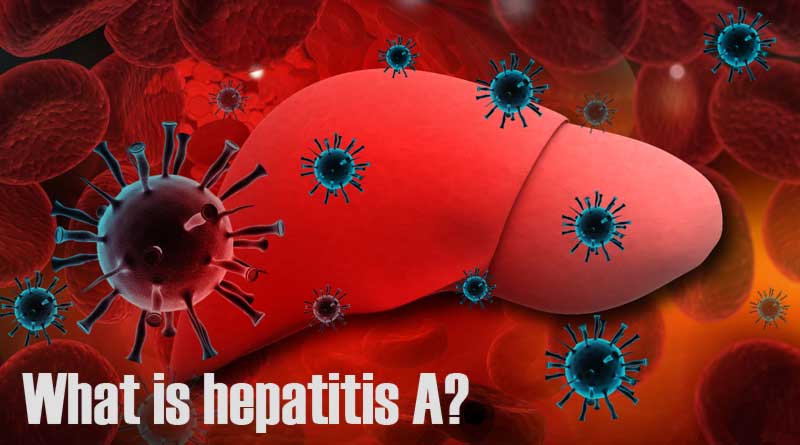Hepatitis A is a virus, or infection, that causes liver disease and inflammation of the liver. Viruses can cause sickness. For example, the flu is caused by a virus. People can pass viruses to each other. Inflammation is swelling that occurs when tissues of the body become injured or infected. Inflammation can cause organs not to work properly.
Hepatitis A facts
- It is an inflammatory disease of the liver caused by a virus.
- The liver stores nutrients and vitamins, improves food digestion, helps prevent from infections, and removing harmful substances from blood.
- These viruses cause the disease termed hepatitis A
- People who take illegal drugs, live with individuals that have the disease, travel to developing countries and homosexuals are at higher risk of infection.
- This virus can be transmitted to others by contaminated stools (feces), foods prepared by an infected person, contaminated water, and close personal contact (for example, touching hands, sex), with an infected person but not by sneezing, cough, hugging (without skin contact) or by being near an infected person.
- Some young infected individuals may have no symptoms. In other infected individuals symptoms of hepatitis A may include flu-like symptoms such as tiredness, stomach discomfort, fever, decreased appetite, and diarrhea; light-colored stools; more specific symptoms include dark yellow urine, and jaundice (white of eyes and skin become yellowish).
- It is diagnosed by commonly available blood tests
- It resolves in most patients in a few weeks without treatment; a doctor may prescribe medications to reduce symptoms.
- Hepatitis A vaccine can help protect against the disease; two shots are required, but some protection begins even after the first shot; the shots do not protect individuals against other hepatitis-causing viruses (types B, C and others).
- Hepatitis A immune globulin may protect some people if administered shortly after initial exposure to the virus; research is ongoing to produce other treatments.
What is the liver?
The liver is an organ that does many important things. You cannot live without a liver.
The liver:
- removes harmful chemicals from your blood
- fights infection
- helps digest food
- stores nutrients and vitamins
- stores energy
Symptoms of Hepatitis A
- The incubation period is usually 14–28 days.
- Symptoms of hepatitis A range from mild to severe, and can include fever, malaise, loss of appetite, diarrhea, nausea, abdominal discomfort, dark-colored urine and jaundice (a yellowing of the skin and whites of the eyes). Not everyone who is infected will have all of the symptoms.
- Adults have signs and symptoms of illness more often than children. The severity of disease and fatal outcomes are higher in older age groups. Infected children under 6 years of age do not usually experience noticeable symptoms, and only 10% develop jaundice. Among older children and adults, infection usually causes more severe symptoms, with jaundice occurring in more than 70% of cases. The disease sometimes relapses. The person who just recovered falls sick again with another acute episode. This is, however, followed by recovery.
How could I get hepatitis A?
This contact could occur by:
- eating food made by an infected person who didn’t wash his or her hands after using the bathroom
- drinking untreated water or eating food washed in untreated water
- placing a finger or object in your mouth that came into contact with an infected person’s stool
- having close personal contact with an infected person, such as through sex or caring for someone who is ill
You cannot get hepatitis A from
- being coughed or sneezed on by an infected person
- sitting next to an infected person
- hugging an infected person
A baby cannot get hepatitis A from breast milk
What are the symptoms of hepatitis A?
Most people do not have any symptoms of this disease. If symptoms occur, they include
- feeling tired
- muscle soreness
- upset stomach
- fever
- loss of appetite
- stomach pain
- diarrhea
- dark-yellow urine
- light-colored stools
- yellowish eyes and skin, called jaundice
Symptoms of hepatitis A can occur 2 to 7 weeks after coming into contact with the virus. Children younger than age 6 may have no symptoms. Older children and adults often get mild, flulike symptoms. See a doctor right away if you or a child in your care has symptoms of hepatitis A.
How is hepatitis A diagnosed?
A blood test will show if you have hepatitis A. Blood tests are done at a doctor’s office or outpatient facility. A blood sample is taken using a needle inserted into a vein in your arm or hand. The blood sample is sent to a lab to test for hepatitis A.
How is hepatitis A treated?
Hepatitis A usually gets better in a few weeks without treatment. However, some people can have symptoms for up to 6 months. Your doctor may suggest medicines to help relieve your symptoms. Talk with your doctor before taking prescription and over-the-counter medicines.
See your doctor regularly to make sure your body has fully recovered. If symptoms persist after 6 months, then you should see your doctor again.
When you recover, your body will have learned to fight off a future hepatitis A infection. However, you can still get other kinds of hepatitis.
How can I avoid getting hepatitis A?
You can avoid getting hepatitis A by receiving the vaccine. Vaccines are medicines that keep you from getting sick. Vaccines teach the body to attack specific viruses and infections. The vaccine teaches your body to attack the hepatitis A virus. The hepatitis A vaccine is given in two shots. The second shot is given 6 to 12 months after the first shot. You should get both hepatitis A vaccine shots to be fully protected. All children should be vaccinated between 12 and 23 months of age. Discuss the hepatitis A vaccine with your child’s doctor. Adults at higher risk of getting hepatitis A and people with chronic liver disease should also be vaccinated. If you are traveling to countries where hepatitis A is common, including Mexico, try to get both shots before going. If you don’t have time to get both shots before you travel, get the first shot as soon as possible. Most people gain some protection within 2 weeks after the first shot.
You can also protect yourself and others from hepatitis A if you
- always wash your hands with warm, soapy water after using the toilet or changing diapers and before fixing food or eating
- use bottled water for drinking, making ice cubes, and washing fruits and vegetables when you are in a developing country
- tell your doctor and your dentist if you have hepatitis A
What should I do if I think I have been exposed to the hepatitis A virus?
- See your doctor right away if you think you have been in contact with the hepatitis A virus. A dose of the hepatitis A vaccine or a medicine called hepatitis A immune globulin may protect you from getting sick if taken shortly after coming into contact with the virus.
Eating, Diet, and Nutrition
- If you have hepatitis A, you should do things to take care of yourself, including eating a healthy diet. Avoid drinking alcohol, which can harm the liver. Talk with your doctor before taking vitamins and other supplements.
Transmission
- This virus is transmitted primarily by the fecal-oral route; that is when an uninfected person ingests food or water that has been contaminated with the feces of an infected person. In families, this may happen though dirty hands when an infected person prepares food for family members. Waterborne outbreaks, though infrequent, are usually associated with sewage-contaminated or inadequately treated water.
- The virus can also be transmitted through close physical contact with an infectious person, although casual contact among people does not spread the virus.

Who is at risk?
Anyone who has not been vaccinated or previously infected can get infected with this virus. In areas where the virus is widespread (high endemicity), most infections occur during early childhood. Risk factors in intermediate and high endemicity areas include:
- poor sanitation;
- lack of safe water;
- use of recreational drugs;
- living in a household with an infected person;
- being a sexual partner of someone with acute hepatitis A infection; and
- travelling to areas of high endemicity without being immunized.
- use illegal drugs, including non injection drugs.
- Also, men who have sex with men are more likely to get hepatitis A.
Diagnosis
Cases of this disease are not clinically distinguishable from other types of acute viral hepatitis. Specific diagnosis is made by the detection of HAV-specific Immunoglobulin G (IgM) antibodies in the blood. Additional tests include reverse transcriptase polymerase chain reaction (RT-PCR) to detect the hepatitis A virus RNA, and may require specialised laboratory facilities.
Prevention
Improved sanitation, food safety and immunization are the most effective ways to combat hepatitis A.
The spread of hepatitis A can be reduced by:
- adequate supplies of safe drinking water;
- proper disposal of sewage within communities; and
- personal hygiene practices such as regular hand-washing with safe water.
Several injectable inactivated hepatitis A vaccines are available internationally. All are similar in terms of how well they protect people from the virus and their side-effects. No vaccine is licensed for children younger than 1 year of age. In China, a live oral vaccine is also available.
Nearly 100% of people develop protective levels of antibodies to the virus within 1 month after injection of a single dose of vaccine. Even after exposure to the virus, a single dose of the vaccine within 2 weeks of contact with the virus has protective effects. Still, manufacturers recommend 2 vaccine doses to ensure a longer-term protection of about 5 to 8 years after vaccination.
Millions of people have received injectable inactivated hepatitis A vaccine worldwide with no serious adverse events. The vaccine can be given as part of regular childhood immunizations programs and also with other vaccines for travelers.
Treatment
There is no specific treatment for this disease. Recovery from symptoms following infection may be slow and may take several weeks or months. Most important is the avoidance of unnecessary medications. Acetaminophen / Paracetamol and medication against vomiting should not be given.
Hospitalization is unnecessary in the absence of acute liver failure. Therapy is aimed at maintaining comfort and adequate nutritional balance, including replacement of fluids that are lost from vomiting and diarrhea.
References:
http://www.parsiteb.com
www.ClinicalTrials.gov
www.medicinenet.com
www.who.int
 Parsi Teb Physical and Mental Health Journal
Parsi Teb Physical and Mental Health Journal 


